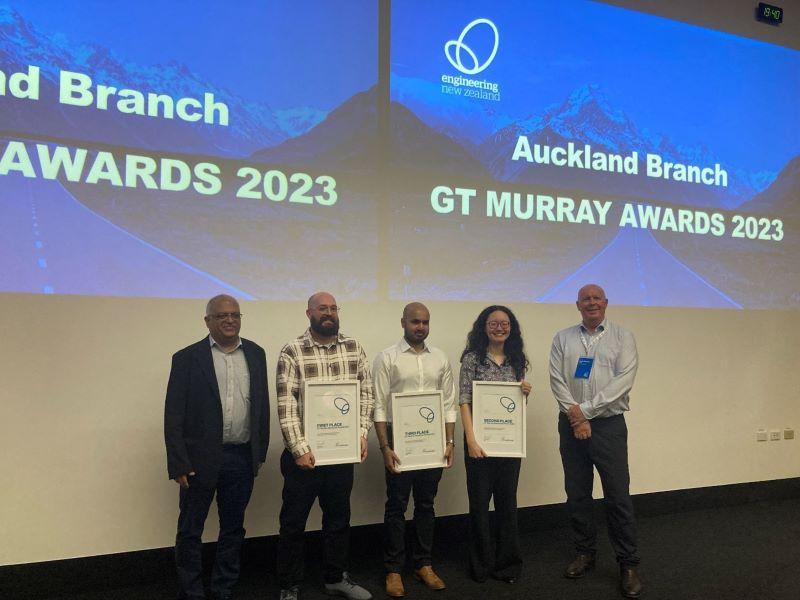Two outstanding young engineers have been recognised by Engineering New Zealand’s Auckland Branch’s GT Murray Award for the best student member presentation on an engineering research or design project.
While engineers possess many of the ideas and skills needed to solve world problems, the GT Murray Award is as much about being able to present ideas clearly as it is demonstrating innovation and ingenuity.
The winner Dylan Maurice, representing UNITEC, wowed the judges and audience with his fascinating presentation on the design of a micro hydro turbine generator to power a self-sufficient leak detection system for water pipes.
His presentation took the audience on a journey through the design and testing of various models of the micro hydro generator. The tiny generator was designed to provide a 100-mA current while minimising the turbine’s impact on flow rate and outlet pressure within the water pipe system.
It was great example of engineering balancing the required power output whilst minimising the impact on the pipe flow. The turbine is used to charge a battery which would continue to supply the electrical current if the flow was to be interrupted by a leak.
Runner-up Michelle Delves inspired the audience with her presentation on “Modelling ventilation and the movement of aerosol based infectious particles within a room”. She demonstrated the balance between using a detailed computational fluid dynamic (CFD) simulation versus a user-friendly simple Python model.
The Python model had been developed to provide quick and accurate low-definition simulations with visualisations demonstrating flow behaviour of the particles in different scenarios. Although not as accurate as the CFD model the usability this was more than compensated for by the increased usability in the field.
Mark Simento, one of the judges, said, “The talent coming through our academic institutions shows so much promise and it was a privilege to observe and adjudicate three fine young engineers. Each represented their institution and themselves with distinction. I wish them all the best for their next stage as engineers!”
Sabrina Naseem, judge and former winner said of this year’s recipients “passion for what they do truly shone through, captivating the audience and leaving a lasting impression” and that it was “evident that their hard work and dedication to preparing for this presentation paid off.”
Host Dave Brierley, Chair of the Auckland Branch, said, “The enthusiasm of these young presenters was inspiring. Listening to them gives me confidence in the future of Engineering in New Zealand and it was really uplifting to see a common theme of efficient engineering solutions running through all the students’ presentations.”
Notes to reporters
Dylan Maurice’s project was a collaboration with Lechen Liu, his supervisors Ashley Yan and Wayne Holmes, and physics tutor Hooman Zarreh.
Michelle Delves would like to thank Fisher & Paykel Healthcare and their representative supervisor Mike Ronayne for the opportunity to collaborate on this project, project partner Maya Speers, and university supervisors Richard Clarke and Maedeh Amirpour.
The GT Murray Award is presented by Engineering New Zealand’s Auckland Branch and open to Engineering New Zealand Student members at Auckland tertiary institutions. It is named for GT Murray, an early civil engineer who worked on major public projects in Taranaki, Wellington Auckland and who was one of the early members of IPENZ (now Engineering New Zealand). It was established after his death in 1947 and has a total prize pool of nearly $1,000.






